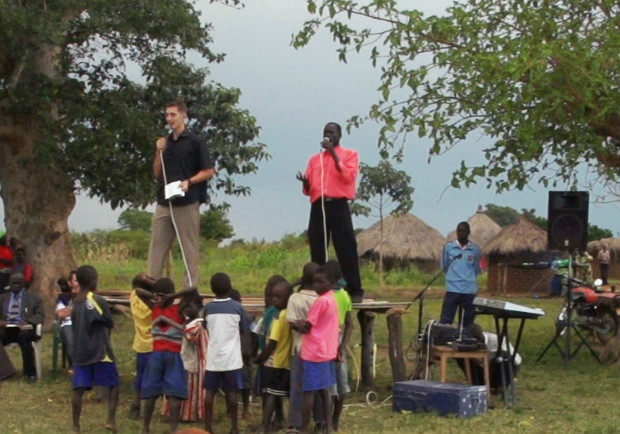What do the Winter Olympics in Russia, the governor's race in Massachusetts, LGBT laws in Uganda, and a unanimous U.S. Supreme Court decision all have in common?
Massachusetts pastor Scott Lively, who could soon be coming to a movie screen near you.
Lively features prominently in the Africa-made documentary God Loves Uganda, which makes its U.S. debut tomorrow. But the exposure for Lively, who last week announced his candidacy for governor of Massachusetts, might not be such a good thing. Reason: It focuses on his alleged support for proposed legislation in Uganda that initially included the death penalty for gays and lesbians.
According to the Daily Maverick, the documentary shows Lively instructing Ugandans that "gays are pederasts, that gays were responsible for Nazi Germany, that gays have taken over the UN and that gays are coming to Uganda to 'recruit your children.' But, Lively says, 'Uganda can be the first country to stop them' if they implement 'public policy that discourages homosexuality.'"
Lively, who runs Abiding Truth Ministries and a Christian coffee shop, says that he did address members of Uganda's parliament in advance of MP David Bhatti proposing the controversial law. And he recently took some credit for a new anti-gay law in Russia that has LGBT activists threatening a boycott of the Sochi Olympics. But as Lively explains on his website:
Let me be absolutely clear. I do not support the proposed anti-homosexuality law as written. It does not emphasize rehabilitation over punishment and the punishment that it calls for is unacceptably harsh. However, if the offending sections were sufficiently modified, the proposed law would represent an encouraging step in the right direction.
To fight back against Lively, Sexual Minorities Uganda (SMUG), a non-governmental organization that supports Uganda's LGBTQ community, accused Lively of both U.S.- and Uganda-based persecution in 2012. The lawsuit was filed in Massachusetts under the U.S. Alien Tort Statute (ATS), which allows human-rights-abuse survivors to sue U.S. perpetrators.
However, Lively seemed to gain inadvertent help from a Supreme Court decision earlier this year, when justices ruled that the ATS does not apply extraterritorially. According to the Los Angeles Times:
In a 9-0 decision, the high court tossed out a lawsuit brought by Nigerians against Royal Dutch Petroleum alleging the company conspired with the Nigerian regime in a campaign of rape, torture and murder in the oil-rich delta in the early 1990s. The suit had become a test of whether U.S. courts could serve as a judicial forum for victims of gross human rights abuses abroad.
But the unanimous ruling also ostensibly narrows "the ability of foreigners to use U.S. courts to sue over human rights abuses—presumably including religious persecution—that occurred abroad," noted Religion Clause's Howard Friedman. (For example, the ATS has been used successfully in a case involving Oscar Romero, but unsuccessfully in a case involving Sudanese Christians.)
Yet, Friedman also noted that SMUG's suit against Lively hasn't been tossed out quite yet. A Massachusetts federal district court spent 79 pages detailing its refusal to dismiss the case, in part because "the restrictions … on extraterritorial application of the ATS do not apply to the facts as alleged in this case, where Defendant is a citizen of the United States and where his offensive conduct is alleged to have occurred, in substantial part, within this country."
What that means for Lively, especially with God Loves Uganda's upcoming release, remains to be seen. But it does seem that the film itself presents "too blurry a picture" to do much damage to Lively's "minor" reputation in the U.S., CT reviewer John G. Stackhouse Jr. wrote in May. Stackhouse criticized the film for "(blurring) 'American conservatives' with 'American evangelicals,'" many of whom actually have denounced Bahati's proposed anti-homosexuality legislation for years.
CT reported last December that the bill was expected to pass a vote in parliament. Prior to that, CT reported how the bill, which was one of CT's Top 10 News Stories of 2010, divided American and Ugandan Christian leaders, with American leaders largely condemning the bill and Ugandan leaders largely supporting it. CT also noted in an editorial how the bill was making cross-cultural relations more complex than ever.









